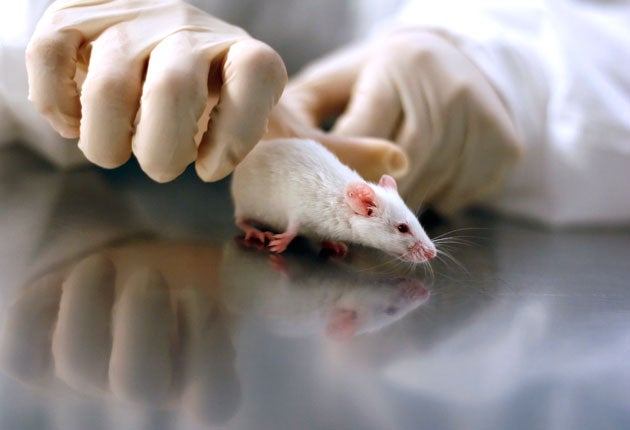Animal rights group declares war on leading health charities
Research into cancer, heart disease and Alzheimer's could be set back by boycott

Britain's leading health charities last night warned that vital medical research into cancer, heart disease and Alzheimer's could be set back by decades because of a high-profile boycott campaign being launched by animal rights campaigners.
Animal Aid plans to take out a series of newspaper adverts urging the public to stop giving money to Cancer Research UK, the British Heart Foundation, the Alzheimer's Society and Parkinson's UK unless they end their support for animal testing.
But the campaign has been condemned as irresponsible and damaging by the charities and scientists, who have warned that it could set back medical research and damage other important areas of the charities' work.
"This is an illogical and ill-conceived campaign," said Lord Willis of Knaresborough, the chairman of the Association of Medical Research Charities. "It will have consequences for charities targeted as, during tight economic times, any small downturn in donations could really put back cures by decades."
Colin Blakemore, a Professor of Neuroscience at the University of Oxford, added: "This is an utterly irresponsible attack by Animal Aid on some of the most important charitable contributors to medical research in this country.
"These charities have a duty to use money given to them to support patients and to understand and treat disease. They support research on animals only when it's absolutely essential. If Animal Aid were successful in discouraging donation to medical charities, they would be guilty of delaying progress towards treatments and cures for devastating conditions."
Animal Aid yesterday published a report called Victims of Charity which, it said, highlighted charity-funded tests which caused "appalling suffering" to animals such as mice, monkeys, pigs and dogs. In total, 66 charities were identified as using public donations to fund animal research.
The four named charities were singled out as organisations of "some standing". Together they have an income of more than £710m a year. Animal Aid called on members of the public to withhold donations from the charities until they promise to stop funding animal experiments. Its director, Andrew Tyler, said: "Animal Aid is under no illusions as to the pro-animal research lobby's financial and political clout. But the public do not like the idea of animals enduring great suffering to no purpose, and Victims of Charity argues that this is precisely what is happening."
But Professor Tipu Aziz, who has conducted research using animals as part of his work on Alzheimer's, said it would not have been possible without them. "Medical breakthroughs throughout history have been achieved through animal research," he said. "If you stop animal research you will stop medical progress."
Privately, the charities are concerned that the Animal Action campaign could have an effect on donations – but they are also worried about tackling the organisation head-on in case it exacerbates the problem. But scientists who work in the area argue that this concern is misplaced. They point out that, since the scientific community took on animal rights activists, public support for testing had increased.
Research carried out last year by Ipsos Mori showed that nine in 10 people accepted the idea of animal research and testing to some degree. About three-quarters accepted animal studies as long as they were for medical research purposes.
Dr David Scott, director of science funding at Cancer Research UK, said: "We do no research with monkeys, dogs or cats. We have strict ethical policies and follow guidelines to ensure that animals are only used where there's no alternative."
Wendy Higgins, from Humane Society International, said she urged supporters to back medical charities which did not use animal research.
"There are charities you can give money to which do not use animals in their research and we would encourage our people to make a positive choice to support them," she said.
Groups in the line of fire
Cancer Research UK
Annual income: £446m (2009/2010)
Annual funding for research involving animals: £334m but no breakdown for animal experiments.
Species of animal Mice, fruit flies, microscopic worms. No trials on monkeys, dogs, cats.
Comment: "We have strict ethical policies in relation to animals and follow rigorous government guidelines to ensure that animals are only used where there's no alternative. Millions of people are alive thanks to life-saving treatments for cancer."
British Heart Foundation
Annual income: £214m (2009/2010)
Annual funding for research involving animals: £48.4m (2009/2010).
Species of animal Mice, rats, zebrafish. Sometimes uses "other animals", not specified.
Comment: "Research funded by the BHF advances our understanding of the heart and circulatory system in order to improve our ability to prevent, diagnose, monitor and treat cardiovascular disease – saving and improving the lives of those people affected."
Alzheimer’s Society
Annual income: £58.7m (2009/2010)
Annual funding for research involving animals: £700,000 (approximately)
Species of animal Maggots, flies, mice and rats. No funds for research on primates.
Comment: "Our research aims to move us closer to a cure and improve the quality of life of people with dementia. We strive to ensure that alternatives are used where possible, that the minimum number of animals are used and that researchers keep to the highest welfare standards."
Parkinson's UK
Annual income: £21m (2010)
Annual funding for research involving animals: £8m (approximately)
Species of animal Fruit flies, worms, rodents, zebrafish.
Comment: "Experiments involving accurate animal models of Parkinson's are the key to improved drug screening and swifter movement into clinical trials involving humans for the best drugs that will allow people with Parkinson's to lead a normal life, free from its symptoms."
Join our commenting forum
Join thought-provoking conversations, follow other Independent readers and see their replies
Comments
Bookmark popover
Removed from bookmarks